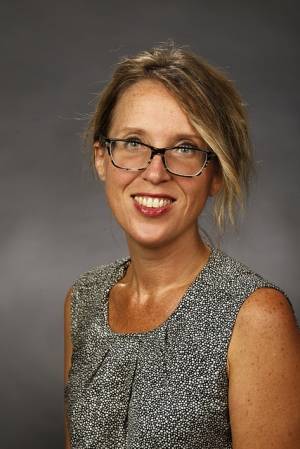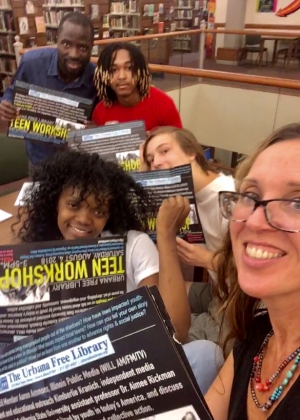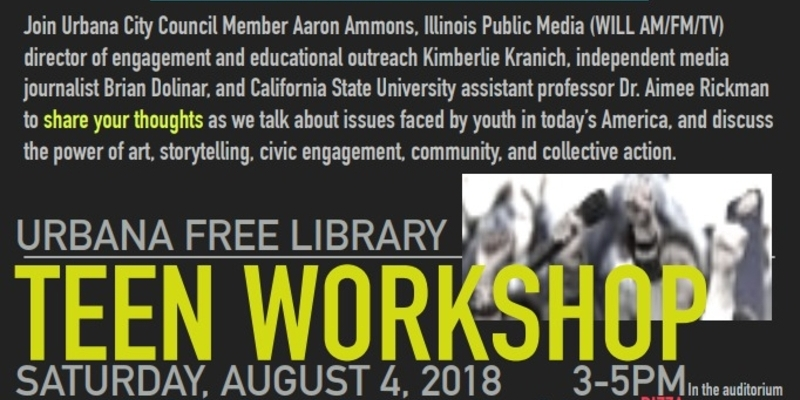California State University Professor, ethnographer, Director of Localization Allies (LA) and author Dr. Aimee Rickman is back in Urbana, her home of 21 years, to share an important message: teens in today’s America are not being supported or heard. Her recently released book, Adolescence, Girlhood, and Media Migration (available in both UIUC library system and the Urbana Free Library) is based on her Ph.D. dissertation ethnographic fieldwork conducted in the Midwest. In it, she explores the relationship young, rural Midwest girls have with social media use. Rickman’s work was critical to pioneering the arena of social media research in academia and was conducted at a time when most scholars did not take this concept seriously.
 Over the years, however, many have recognized the value in studying social media use, whether it is understanding young people and online social justice movements or identifying methods to address online bullying. Rickman has continued her novel line of work that began at UIUC, at California State University, Fresno, through her many engagements including directing the Youth + Social Media Research Lab.
Over the years, however, many have recognized the value in studying social media use, whether it is understanding young people and online social justice movements or identifying methods to address online bullying. Rickman has continued her novel line of work that began at UIUC, at California State University, Fresno, through her many engagements including directing the Youth + Social Media Research Lab.
While many adults have theories speculating on social media use amongst teens such as them being “inherently digital” or that they are looking for trouble, Rickman found that not to be the case during her conversations and listening to teens. Instead, she found that young girls in the rural Midwest are going online to make something of their lives that they couldn’t offline. The girls didn’t have information or power in their offline lives to move out of the marginal positions they were in, so they sought out these spaces online.
Last Sunday, July 29th, Rickman led a discussion at the Urbana Free Library titled “Social Media Risks and Realities.” She addressed these stereotypes on online risk, including a discussion of the recent Facebook privacy breach through Cambridge Analytica’s relationship to Facebook, in which private information was sold and used in ways Facebook users didn’t consent to. Additionally, local teens trained as Smartphone technicians helped the audience find some settings on their phones that they may not have known about.
Though Rickman won’t be officially touring with her book on this topic until its paperback version is released next year, she couldn’t sit back knowing this sense of helplessness that many teens are facing today.
 And so, Localization Allies (LA) was created. With a team of dedicated individuals, Rickman brings together key voices for youth in the C-U community to create offline spaces for youth to gather and feel valued. In May, LA led a workshop at University High School in Urbana to listen to youth about issues in their lives. As a call to action from the messages of feeling powerless and not taken seriously, LA will be hosting their second workshop on their Listening Tour this Sunday, from 3-5 p.m. at the Urbana Free Library. Thanks to Urbana Free Library, Dixon Graphics, Elliott Counseling Group, Rumours Hat Shoppe, Vonderheide Construction, and Common Ground Food Co-op, the event is free for any teen wanting to join and pizza and treats will be served. All teens are welcome.
And so, Localization Allies (LA) was created. With a team of dedicated individuals, Rickman brings together key voices for youth in the C-U community to create offline spaces for youth to gather and feel valued. In May, LA led a workshop at University High School in Urbana to listen to youth about issues in their lives. As a call to action from the messages of feeling powerless and not taken seriously, LA will be hosting their second workshop on their Listening Tour this Sunday, from 3-5 p.m. at the Urbana Free Library. Thanks to Urbana Free Library, Dixon Graphics, Elliott Counseling Group, Rumours Hat Shoppe, Vonderheide Construction, and Common Ground Food Co-op, the event is free for any teen wanting to join and pizza and treats will be served. All teens are welcome.
In the workshop, teens will be joined by Rickman, Urbana City Council Member Aaron Ammons, Illinois Public Media (WILL-AM/FM/TV) Director of Engagement and Educational Outreach Kimberlie Kranich, and Independent Media journalist Brian Dolinar to be heard, share ideas, and have pizza. Ammons will discuss what it’s like to run for public office and how art is used in politics. Specifically, he will be talking about how Speak Café uses art to bring awareness. Kranich will discuss laws impacting the way young people can make change and voter information, for those able to vote already and those who will be able to vote soon. Journalist Dolinar will be present to spread awareness of the realities of marginalized young people.
What can teens expect to walk away with? Practical information to use, a familiarity with local youth-advocating spaces, efforts, people, and resources, and most importantly, that their thoughts have been shared and heard. As Rickman says, “We like to say that children are the future, but children — including teens — are very real now. I hope they feel from this that many in Champaign-Urbana take them very seriously, and see them as extremely valued and important members of our local community, our country, and our world. We are in this together.”
Photos provided by Aimee Rickman








